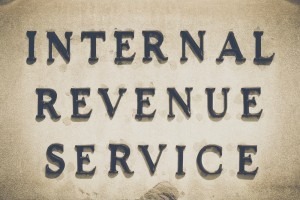NOTICE: Federal Tax Lien is underway.
The Facts:
- The 2016 IRS budget keeps the IRS funded at fiscal 2015 levels.
- The 10.6 billion in funding is 1.7 billion less than the President’s budget.
- Since 2010, IRS funding has been reduced by 18%.
 What this means to US taxpayers:
What this means to US taxpayers:
13,000 fewer IRS employees, 10,000 fewer enforcement staff, the lowest individual and business audit levels in 10 years, and an average wait time of 23 minutes to receive assistance via phone when calling into the IRS.
In direct relation, the IRS now resorts to indirect, ancillary methods to assist with the assessment and collection of tax due. This article explores three such methods identified recently by the National Taxpayer Advocate.
Notices of Federal Tax Lien
What is a notice of Federal Tax Lien (NFTL)? An NFTL is a legal document that establishes the priority of the Federal government’s interest in a taxpayer’s property. An NFTL comes into being when a taxpayer owes the Federal government a balance due of tax in excess if certain thresholds.
How does a Federal Tax Lien (FTL) negatively affect a taxpayer? An FTL normally takes a super-priority position in related to other creditor liens. Additionally, the credit bureaus list FTLs on taxpayer’s credit report, which causes a severe drop in creditworthiness. In turn, there is an impact in the ability to obtain financing for a home, secure affordable rental housing, find or maintain a job, even becoming insured could be hindered.
Thus, a vicious loop begins that almost guarantees unpaid tax debt.
Finally, FTLs are dischargeable in bankruptcy, but the underlying debt may survive and cause an immediate lien foreclosure on post-bankruptcy assets by the Centralized Lien Unit of the IRS.
The general rule of thumb is to complete an Offer in Compromise to extinguish FTLs then enter bankruptcy.
What is Meaningful Contact Practice?
Based on the guidance of the IRS internal manual, the IRS must make reasonable efforts to contact a taxpayer before filing an NFTL. The IRS allows a very paltry timeline of 10 days for contact and resolution.
The National Taxpayer Advocate released a report indicating that in 2015, the IRS recorded that 62% of contact calls (predictive dialer) from the Small Business/Self-Employed division resulted in no contact with taxpayers. Even worse, 71% of contact calls from the Wage & Investment division resulted in no contact with taxpayers.
The Advocate indicates that the IRS should adopt best practice methods from private sector creditors.
For example, the Advocate believes in the use of early intervention pre-collection methods over a 45-day period.
What is the best strategy for a taxpayer dealing with this type of situation?
On September 30th, 2015, the IRS Joint Operations Center reported that only 37% of taxpayers accessed IRS call centers to make installment agreement arrangements prior to the filing of an NFTL.
This means that roughly two out of three taxpayers will be unable to access the IRS to make proactive arrangements.
The best strategy for dealing with an NFTL situation is as follows:
- Gain an understanding of your tax debt.
- Where does the debt amount stand in relation to the NFTL filing threshold?
- Gain an understanding of the different statute of limitations.
- Assessment Statute Expiration Date (ASED)
- Collection Statute Expiration Date (CSED)
- Gain an understanding of collection alternatives,
- Installment Agreement
- Offer in Compromise
- Currently not Collectible
- Gain an understanding of the minimum information needed by the IRS to make a decision on whether or not to file an NFTL.
- IRS Form 433-A vs. Form 433-D vs. Form 433-F
- Gain an understanding of how the FTL work during bankruptcy and post-bankruptcy.
- If Bankruptcy is part of the fact pattern.
Taxpayers can only make smart decisions when they have actionable data. The five-part game plan above can place you in a position for success and avoidance of the negative ramifications of an NFTL filing. Still need tax lien help with federal tax liens? Contact us today.
